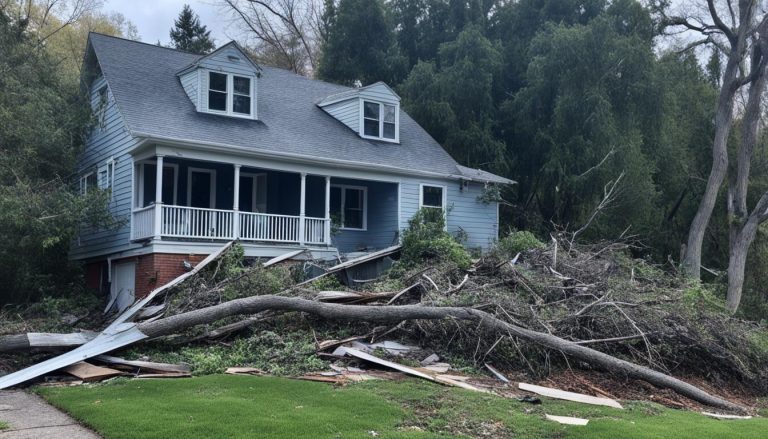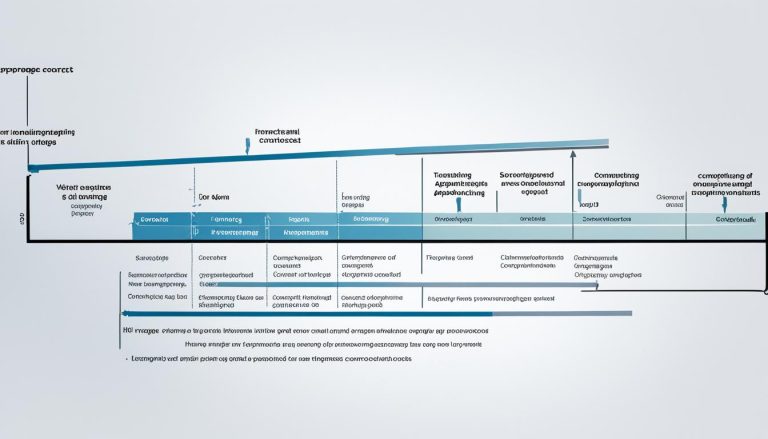Council housing in the UK operates through a structured yet competitive system. For many applicants, reaching the 4th position on a bidding list can raise both hope and confusion. What does this position actually mean? Does it offer a realistic chance of securing a property, or is it too far down the line?
This guide aims to provide a clear understanding of what 4th position bidding entails in the UK council housing system, how the allocation process works, and what factors influence your success in securing a home.
What Does Being in 4th Position for a Council House Mean?
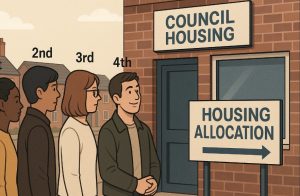
When an applicant sees they are in the 4th position after placing a bid on a council house, it means they are fourth in the ranking for that specific property. This ranking is based on the council’s housing allocation policy, which evaluates a combination of factors like housing need, banding, and local connections.
Being in 4th place does not disqualify a person from getting the property—it simply means three other applicants are ahead in the priority list. The council offers the property to the highest-ranked bidder first. If that applicant declines the offer or is found ineligible, it moves to the next person on the list.
4th position scenarios:
- High demand areas: Unlikely the offer will go down to fourth place.
- Low demand or less desirable properties: Higher likelihood of being offered.
- Special requirements (e.g., accessibility): May see top bidders skip if the home doesn’t match their needs.
How Does the Council House Bidding System Work in the UK?
The council house allocation system in the UK is mainly operated through Choice-Based Lettings (CBL). Applicants on the housing register can bid weekly on properties that meet their eligibility.
Key Stages in the Bidding Process
- Register with the local authority for housing.
- Undergo a needs assessment to determine the appropriate priority band.
- Log in to the council’s housing portal during open bidding cycles (usually weekly).
- Browse eligible listings and place up to the allowed number of bids.
Councils usually allow:
- 1 to 3 bids per week.
- Viewing of shortlisted homes before making a final decision.
All bids are evaluated once the cycle closes. Applicants are then ranked for each property based on banding, local connection, and suitability.
What Are Priority Bands in Council Housing?
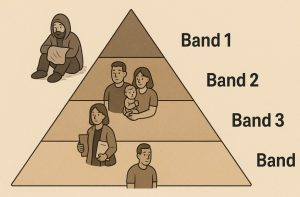
Every council assigns applicants a priority band to reflect the urgency of their housing need. These bands determine how high someone will rank when they place a bid.
Table: Typical Priority Band Breakdown
| Band | Description | Example Situations |
| 1st Position | Urgent Need | Homeless, severe health issue, fleeing violence |
| 2nd Position | High Need | Overcrowding, risk of homelessness, medical needs |
| 3rd Position | Moderate Need | Need to move closer to job or school |
| 4th Position | Low or No Assessed Need | Secure housing but seeking better conditions |
Some councils might also assign subcategories or use slightly different naming conventions, but the core principle remains consistent: higher bands are prioritised.
How Is Your Bidding Position Determined?
The final bidding position is calculated after a bidding cycle closes. It is influenced by a set of weighted factors:
- Priority Band: The single most significant factor.
- Bidding Time: Earlier bids among applicants with the same band and criteria are given precedence.
- Local Connection: Additional preference may be given to those who live or work in the area.
- Suitability: Matching the applicant’s needs (e.g., number of bedrooms, ground-floor access).
Two applicants in the same band may still receive different rankings based on when they bid and whether they have a stronger local tie.
What Happens After You Place a Bid on a Council House?
After you’ve placed your bid and the cycle ends, the council will review all bids and shortlist applicants. The shortlist reflects the ranking order. The council then begins the offer process.
Table: Offer Process Step-by-Step
| Step | Description |
| 1 | Shortlist finalised post bidding cycle |
| 2 | Top-ranked applicant contacted for viewing/acceptance |
| 3 | If declined, next person on the list is contacted |
| 4 | Process continues until property is accepted |
In some areas, applicants may be invited to view the property before deciding. Others are offered sight-unseen.
Does Having a Local Connection Help Your Bidding Position?
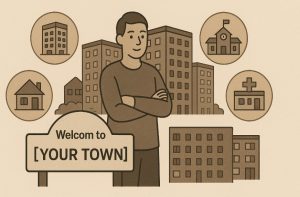
Yes, having a strong local connection often increases your chances of being shortlisted. Councils prioritise applicants who:
- Currently live in the area
- Have lived there for a defined number of years
- Work locally
- Have immediate family in the area
Some councils make local connection a requirement for certain properties. It can serve as a tiebreaker when two applicants share the same band and circumstances.
Can Refusing a Council House Offer Affect Your Future Chances?
Most councils have policies that limit how many offers a person can refuse without facing a consequence. The rules can differ by authority, but generally:
- First refusal might come with no consequence
- After the second or third refusal, the council may:
- Downgrade your priority band
- Temporarily suspend your bidding ability
- Remove you from the housing register (in extreme cases)
Table: Council Response to Refusals (General Example)
| Number of Refusals | Possible Council Response |
| 1 | No impact; noted on record |
| 2 | Warning issued; application reviewed |
| 3 or more | Downgraded priority or temporary bidding block |
Some councils are more lenient if the property refused was unsuitable for valid reasons, such as accessibility, unsafe location, or severe condition issues.
What Can You Do to Improve Your Council House Bidding Success?
Improving your chances involves more than just bidding consistently. Strategic steps can make a difference in your placement:
- Keep your application updated: Ensure all medical needs, changes in income, or family composition are reported.
- Widen your search criteria: Consider properties in less in-demand areas or flats over houses.
- Bid regularly: Some councils track activity, and consistent bidding can indicate ongoing need.
- Understand your eligibility: Only bid on homes you’re actually eligible for in terms of size and type.
- Engage with your housing officer: Some applicants overlook the importance of communication.
Bullet Points (minimal use):
- Submit documentation promptly (e.g., medical letters, eviction notices).
- Check housing portal updates frequently.
- Read property descriptions carefully before bidding.
What Should You Expect If You’re in 4th Place?
While not ideal, being in the 4th position is not the end of the road. Applicants in higher positions often:
- Decline due to property condition or location
- Become ineligible due to changed circumstances
- Miss council deadlines for response
In such cases, the offer will move down to the next eligible person. In fact, many councils confirm that it’s common for homes to be offered to people who were originally ranked 4th, 5th, or even lower.
In high-demand areas like London, movement is less likely. However, in smaller towns or rural areas, 4th position can be quite promising—especially for less popular properties.
How to Improve Your Position in the Council House Bidding System?
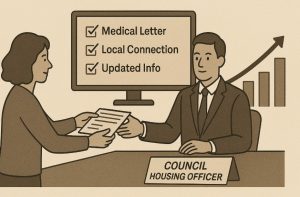
Improving your position in the council house bidding queue depends on how well you understand and respond to the criteria councils use when assessing applicants. While the process can feel rigid, there are legitimate ways to improve your standing and move closer to the top of the shortlist.
1. Ensure Your Application Is Fully Updated
Many applicants lose out on opportunities simply because their housing applications are outdated. If your household situation has changed—for example, through the birth of a child, a change in employment, or an increase in health-related issues—it’s essential to reflect this in your application.
Councils often re-evaluate your banding based on new information, which may push you into a higher priority group. You should also regularly log in to your local housing portal to check for any changes or requests for more documentation.
2. Apply for Medical or Welfare Priority
If your current housing situation is affecting your physical or mental health, you may be eligible for additional priority based on medical or welfare grounds. Councils will usually ask you to provide evidence such as a letter from your doctor or specialist outlining how your living conditions are impacting your well-being.
For example, a person with mobility issues living in an upstairs flat might be granted a higher band if ground-floor or adapted housing is needed. Similarly, welfare needs—like providing care for a dependent family member—can also enhance your housing priority if the case is well-documented.
3. Strengthen Your Local Connection
A strong local connection can significantly improve your ranking. Councils often prefer to house people who already have strong ties to the community, such as long-term residency, local employment, or immediate family living nearby.
If you’ve lived in the area continuously for several years or have worked for a local employer, be sure to make that clear in your application. Some councils require a minimum number of years to establish a local connection, and meeting that requirement can move you up the queue when competing against applicants from outside the area.
4. Bid More Strategically
Being selective about where and how you bid can increase your chances of success. Some applicants continually bid on the most desirable or centrally located properties, which often attract high-priority bidders.
By considering properties that are slightly outside high-demand areas or choosing flats instead of houses, you may find less competition. Being flexible with location, floor level, or type of property could be the difference between staying in 4th position and receiving an offer.
5. Provide Supporting Documentation
When councils assess your application, they rely heavily on the evidence you provide. Submitting strong documentation can help clarify the urgency of your situation.
For example, medical records, eviction notices, or photographs of unsafe housing conditions help councils better understand why you need to move. Supporting documents also serve as verification during reassessments and reviews, giving your case more credibility and potentially unlocking higher priority.
6. Communicate with Your Housing Officer
Staying in contact with your housing officer can also play an important role in advancing your application. They can offer personalised advice and let you know what’s holding your application back.
In some cases, they may suggest submitting new evidence or applying for reassessment. Housing officers also have insight into how properties are allocated in real time, and they can inform you about less-known schemes or opportunities.
7. Appeal or Request a Banding Review
If you feel your banding does not reflect your true level of need, you have the right to appeal or request a reassessment. A formal review process usually requires written justification and supporting evidence, which will then be evaluated by the council.
This could include documentation of deteriorating health, an impending eviction, or increased overcrowding. The process varies by council, but a successful appeal could lead to a band upgrade and improve your future bidding position.
Conclusion
Being in 4th position when bidding for a council house doesn’t mean you’re out of the running—it means you’re still very much in the game. With applicants ahead of you potentially declining offers or being deemed ineligible, your chances remain viable.
Understanding the bidding system, maintaining an up-to-date application, and bidding consistently can all improve your outcomes.
While patience is key, staying informed and proactive ensures you’re well-positioned when the right opportunity comes along. Keep bidding and stay hopeful.
FAQs About Council House Bidding
How long does it take to get a council house from 4th position?
It depends on how many applicants above you accept the offer. In some cases, you may be offered the home within days if others decline.
Can my position in the bidding queue change?
Once the bidding closes, positions are fixed for that cycle. However, positions may change between cycles as new applicants join or others’ situations change.
Why did I move down the shortlist even after bidding early?
Someone with higher priority or a local connection who bid after you can still be placed higher on the list.
Is it worth bidding if I’m always in 4th or lower position?
Yes, consistent bidding improves your chances, and many properties are declined by those in top positions.
Does medical need affect my housing priority?
Yes. Medical issues often contribute to higher priority banding, especially when supported by documentation.
How many properties can I bid on each week?
Most councils allow between 1 to 3 bids per week. Check your local council’s rules for specifics.
What happens if I reject a council house offer?
Depending on your council’s policies, repeated refusals may lead to a review of your application or a lower band placement.




